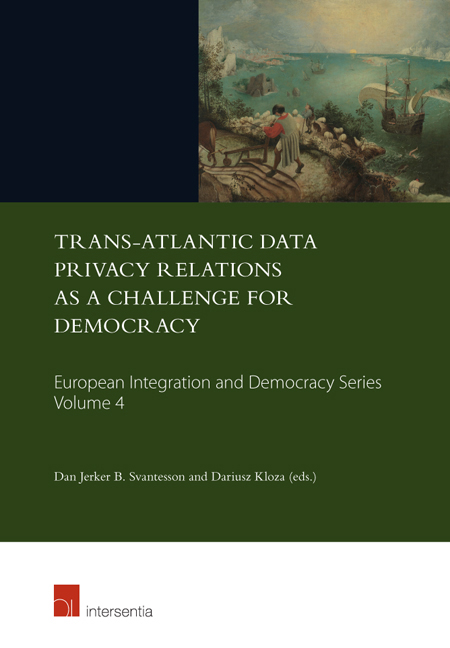Book contents
- Frontmatter
- Foreword
- Preface
- Contents
- List of Abbreviations
- PART I PRIVACY AND …
- SECTION I PRIVACY AND TRANSBORDER FLOWS OF PERSONAL DATA
- INVITED COMMENTS
- SECTION II PRIVACY AND INTERNATIONAL TRADE
- INVITED COMMENT
- SECTION III PRIVACY AND TERRITORIAL APPLICATION OF THE LAW
- 10 Extraterritoriality in the age of the equipment-based society: do we need the ‘use of equipment’ as a factor for the territorial applicability of the EU Data Protection Regime?
- 11 Jurisdictional Challenges Related to DNA Data Processing in Transnational Clouds
- SECTION IV PRIVACY AND CRIME
- INVITED COMMENTS
- SECTION V PRIVACY AND TIME INVITED COMMENTS
- PART II THEORY OF PRIVACY
- PART III ALTERNATIVE APPROACHES TO THE PROTECTION OF PRIVACY
- INVITED COMMENT
- CONCLUSION
10 - Extraterritoriality in the age of the equipment-based society: do we need the ‘use of equipment’ as a factor for the territorial applicability of the EU Data Protection Regime?
from SECTION III - PRIVACY AND TERRITORIAL APPLICATION OF THE LAW
Published online by Cambridge University Press: 29 September 2018
- Frontmatter
- Foreword
- Preface
- Contents
- List of Abbreviations
- PART I PRIVACY AND …
- SECTION I PRIVACY AND TRANSBORDER FLOWS OF PERSONAL DATA
- INVITED COMMENTS
- SECTION II PRIVACY AND INTERNATIONAL TRADE
- INVITED COMMENT
- SECTION III PRIVACY AND TERRITORIAL APPLICATION OF THE LAW
- 10 Extraterritoriality in the age of the equipment-based society: do we need the ‘use of equipment’ as a factor for the territorial applicability of the EU Data Protection Regime?
- 11 Jurisdictional Challenges Related to DNA Data Processing in Transnational Clouds
- SECTION IV PRIVACY AND CRIME
- INVITED COMMENTS
- SECTION V PRIVACY AND TIME INVITED COMMENTS
- PART II THEORY OF PRIVACY
- PART III ALTERNATIVE APPROACHES TO THE PROTECTION OF PRIVACY
- INVITED COMMENT
- CONCLUSION
Summary
INTRODUCTION
There is a constant flow of information, including personal data, between the European Union and its largest trading partner – the United States The EU – US cooperation, including in the digital trade area, may soon be further strengthened if the Transatlantic Trade and Investment Partnership (TTIP) negotiations are successfully concluded As American privacy standards – and in general the American way of thinking about privacy and personal data protection – differ from the approach adopted by the EU, it is crucial for US companies to be able to assess whether particular processing operations they conduct fall within the scope of the EU data protection legal regime The territorial scope of the EU data protection law, together with rules on transfers of personal data, constitute one of the most important elements of the EU data protection regime from the trans-Atlantic perspective.
EU – US exchange of information should be seen in the context of a bigger picture, which is the development of the information society and a global digital market General access to the Internet, breakthroughs in processing, storage and transmission of information technologies as well as the constant fall in costs of IT equipment – all these have allowed the application of technology in almost all areas of our day-to-day life Advocate General J ä ä skinen is right when he compares the development of the Web to the invention of printing in the fift eenth century Both printing and the Internet irretrievably changed the way information is shared Both allowed for processing of information on a scale never seen before In the information society, processing of data constitutes an inseparable part of our life Connected devices such as smartphones, connected cars, wearables and smart TVs are being used on day-to-day basis as means to not only provide certain services but also to obtain information about their users.
However, globalisation of technology has not been followed by globalisation of legal standards For example, the European data protection standards, set – in particular – in legal acts such as the Council of Europe's Convention 108 and the EU Directive 95/46/EC (the Directive, Data Protection Directive) date from the 1980s and 1990s, the age of telefaxes and land-line phone services.
- Type
- Chapter
- Information
- Publisher: IntersentiaPrint publication year: 2017

